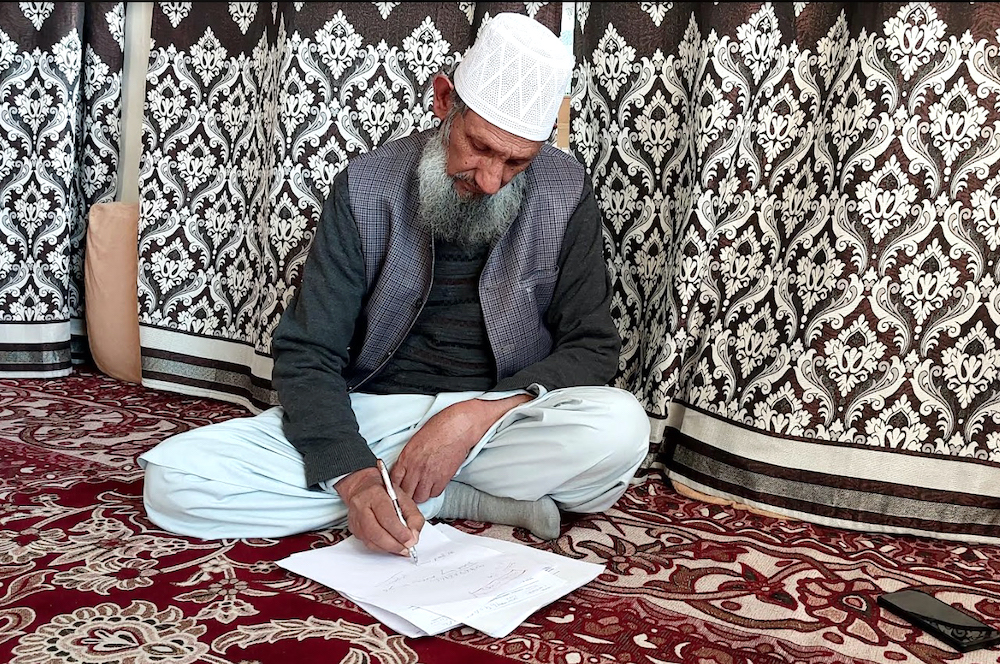Driven by the crisis he faced at home, Kamal Wani understood the critical deficit in society and brought in like-minded to launch a joint struggle for the rights of the deaf and mute. Sammah Masoodi reports the inspiring story of a school teacher who taught policymakers about the rights of the marginal people

Known as Headmaster Saeb, Budgam’s Kamal Wani is not an ordinary teacher. His significant contributions in upholding the rights of the differently abled have made him distinct in his tribe and helped Kashmir manage these marginal people better.
Father of two hearing-impaired children, Wani encountered hardships, and challenges from a very close angle. This led him to launch a battle for decades to get his sons and countless others to have the right that society was denying to them.
Born in 1952, Kamal graduated from the Islamic College of Science and Commerce and soon became a cashier. Later, he was appointed a government teacher, which remained his lifelong career. Classwork apart, Kamal’s contributions were his long battle for the education of the specially-abled.
The Migration
Desperation to get his children educated led him to Abhinandan Home in Srinagar’s Solina locality. After enrolling his sons on the Home, his second life-changing decision was to get uprooted and migrate to Srinagar. “Leaving my home is a painful memory that still pinches my heart. I still yearn for my home,” admitted Wani. “But there was no option. Budgam lacked any such facility.”
After successfully enrolling his children in the special school, Kamal was disappointed with the inadequate teaching resources. There was a lone instructor managing the education of all the differently abled children in a single room.”Since hearing-impaired children are deficient in two senses, it (situation) impacts other senses as well; without special educators and the required equipment, they would not be able to understand even the ABC,” remembers Kamal of those days when he was new in Srinagar. “Arshida Mam was the backbone of this school, but she alone could not make the school function.”
Weighing the costs he paid for educating his kids and the Home’s failure in offering basic education, Kamal decided to fight. “I could not just sit back and let this go,” he said. He reached out to families of differently-abled children and floated the Parents’ Association of Deaf and Dumb (PADD) to fight the “injustice”.
The Take-off
In 1996, PADD petitioned Human Resource Development Ministry flagging the abysmal below one per cent reservation for visually, hearing, and locomotory impaired individuals and pleading it must reach three per cent. A response came a year later when the administration said the law is being examined.
In 1997, PADD started asking the administration to implement vocational training for the specially-abled.
In 2006, Kamal’s team pleaded with the Chief Minister to establish a government school specifically for hearing-impaired students.
The same year, initiated a protracted initiative to make changes in the Solina Home. They requested the social welfare department to get specially trained teachers for the inmates.
“When I visited the school, I found teachers crying due to delays in their salaries, bus drivers not having fuel, and the hostel struggling to find a cook,” remembers Kamal. “The case continued until 2017, but the respondents failed miserably to provide a solution.”
PADD approached the educational minister, the Sarva Shiksha Abhiyan, and the Director of the Social Welfare Department as well but no action was taken. By then, the PADD had reached a break-down point and feared disintegration.
“We fought for years, and although I didn’t want to, I had to give up,” said Bashir Ahmad, PADD President. “There was no one to listen to us. What other option did we have?” added Peer Mohammad, the PADD organiser. Eventually, PADD disintegrated leaving Kamal as the ‘lone warrior’ on the ground.
Seeking Court Help
In 2021, Kamal somehow convinced a few erstwhile PADD members and filed a case in the High Court pleading the social welfare department must protect the fundamental rights of differently abled individuals and provide job opportunities after completing their education.
“We asked for improving the infrastructure and also drafting a policy that would reserve jobs for them,” Kamal said, insisting the idea was to protect one-per cent reservation.
The outcome was encouraging – 80 positions were reserved only for the hearing impaired in Jammu and Kashmir.
JKSSB Case 2021
When differently-abled individuals applied for a Jammu and Kashmir Service Selection Board (JKSSB) examination, every category was given a one per cent reservation. Among the hearing impaired, however, only 16 candidates were selected, even though 80 posts were reserved for them.
The aspirants staged a protest against the JKSSB.”It was an interesting list.
Some students were mentioned at multiple positions; one student was mentioned seven times,” said Kamal.
Kamal wrote to the grievance cell and sought an investigation. As the issue caught the media’s attention, the JKSSB updated the list and gave all 80 seats to the hearing impaired.
“This was our biggest achievement. I am grateful to the parents who contributed to the lawyers’ payment and stood by me.”
Kamal retired from his service in May 2010. He operates from his residence and is satisfied that two of his five children are working. Ishfaq, 32, is a pharmacist and works for the government; Basharat, 30, hearing impaired, stays at home with his sister, Maymoona, 22. Sameer, 26, is a laboratory technician and Shajid is pursuing BTech.















